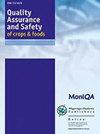Exploring the efficacy of Shexiang Tongxin extract pills in severe heart failure
IF 5.3
3区 农林科学
Q1 FOOD SCIENCE & TECHNOLOGY
引用次数: 0
Abstract
The clinical efficacy of Shexiang Tongxin pills (STP) on cardiac function, inflammation, and prognosis was investigated in patients with severe heart failure. A total of 140 patients with severe heart failure, diagnosed and treated at the Shaoxing Central Hospital and its affiliates, were divided into control and experimental groups. Patients in the control group received conventional treatment, while those in the experimental group were given STP plus conventional treatment. The cardiac functions, levels of inflammatory factors, and outcomes of 6-minute walk distance (6MWD) were assessed and compared after 12 weeks of intervention. Besides, the rehospitalization and mortality proportions were also determined during a 1-year follow-up. In addition, oxygen-glucose deprivation and reperfusion (OGD/R) were conducted to mimic the injury of H9c2 cells in heart failure; cell survival, cytotoxicity, apoptosis, and inflammatory factors were also evaluated. Post-intervention, patients in the experiment group demonstrated greater improvement in cardiac functions, especially regarding left ventricular end-diastolic diameter and N-terminal pro-B-type natriuretic peptide, which were significantly decreased, while left ventricular ejection fraction was significantly increased (P < 0.05). Further, the levels of inflammatory factors, including tumor necrosis factor-α, hypersensitive C-reactive-protein, and interleukin 6, were significantly lower (P < 0.05), and a superior 6MWD outcome was observed in patients from the experimental group, compared to the control group (P < 0.05). After 1-year follow-up, both rehospitalization rate and mortality were significantly decreased in the experimental group, compared to the control group (rehospitalization, 38.57% vs. 55.71%, and mortality, 12.86% vs. 27.14%, respectively; P < 0.05). Furthermore, STP increased cell survival and reduced cell apoptosis, cytotoxicity, and inflammatory response in cardiomyocytes induced by OGD/R. Shexiang Tongxin pill demonstrated significant and promising clinical effects in treating severe heart failure by ameliorating cardiac functions, reducing inflammatory factor levels, and improving patients’ prognosis. In addition, STP ameliorated cellular damage and inflammation at cellular level. Thus, STP demonstrated important clinical values.探讨麝香通心浸膏丸治疗重度心力衰竭的疗效
观察麝香通心丸对重度心力衰竭患者心功能、炎症及预后的临床疗效。共有140名在绍兴市中心医院及其附属医院诊断和治疗的严重心力衰竭患者被分为对照组和实验组。对照组患者给予常规治疗,实验组患者给予STP加常规治疗。在干预12周后,评估并比较心功能、炎症因子水平和6分钟步行距离(6MWD)的结果。随访1年,再住院率和死亡率。采用氧糖剥夺再灌注(OGD/R)模拟心力衰竭时H9c2细胞的损伤;细胞存活、细胞毒性、细胞凋亡和炎症因子也进行了评估。干预后,实验组患者心功能有较大改善,尤其是左室舒张末期内径和n端前b型利钠肽显著降低,左室射血分数显著升高(P <0.05)。此外,炎症因子,包括肿瘤坏死因子-α、超敏c反应蛋白和白细胞介素6的水平显著降低(P <0.05),实验组患者的6MWD预后优于对照组(P <0.05)。随访1年后,实验组患者再住院率和死亡率均较对照组显著降低(再住院率分别为38.57%对55.71%,死亡率分别为12.86%对27.14%;P & lt;0.05)。此外,STP提高了细胞存活率,减少了OGD/R诱导的心肌细胞凋亡、细胞毒性和炎症反应。麝香通心丸在改善心功能、降低炎症因子水平、改善患者预后等方面具有显著的临床疗效。此外,STP在细胞水平上改善了细胞损伤和炎症。因此,STP具有重要的临床价值。
本文章由计算机程序翻译,如有差异,请以英文原文为准。
求助全文
约1分钟内获得全文
求助全文
来源期刊

Quality Assurance and Safety of Crops & Foods
FOOD SCIENCE & TECHNOLOGY-
CiteScore
4.60
自引率
7.50%
发文量
61
审稿时长
1 months
期刊介绍:
''Quality Assurance and Safety of Crops & Foods'' is an international peer-reviewed journal publishing research and review papers associated with the quality and safety of food and food sources including cereals, grains, oilseeds, fruits, root crops and animal sources. It targets both primary materials and their conversion to human foods. There is a strong focus on the development and application of new analytical tools and their potential for quality assessment, assurance, control and safety. The scope includes issues of risk assessment, traceability, authenticity, food security and socio-economic impacts. Manuscripts presenting novel data and information that are likely to significantly contribute to scientific knowledge in areas of food quality and safety will be considered.
''Quality Assurance and Safety of Crops & Foods'' provides a forum for all those working in the specialist field of food quality and safety to report on the progress and outcomes of their research.
 求助内容:
求助内容: 应助结果提醒方式:
应助结果提醒方式:


